Locked behind bars, almost 1,000 screaming macaques are on a feverish rampage. Gangs of former street macaques have spotted their upcoming feast and are jockeying for prime position.
After a few minutes, the keepers come in and the screaming animals are swarmed. Like herding rats, they climb over each other to get their rewards; within seconds, the crates of bananas, jelly and Yakult are empty.
Until very recently, these chaotic scenes took place not behind steel nets but in the centre of Lopburi, a Thai town about 100 miles north of Bangkok, where marauding macaques rule the streets.
Dubbed the “Monkey City,” the animals have become central to Lopburi’s identity and a major draw for curious tourists. As their numbers grow, long-suffering locals have grown fed up.
Homes and people were increasingly under attack; the bleak, grey main street was filled with shuttered shops after businesses moved out to avoid the carnage. The town’s mayor described Lopburi as almost “an abandoned town”.
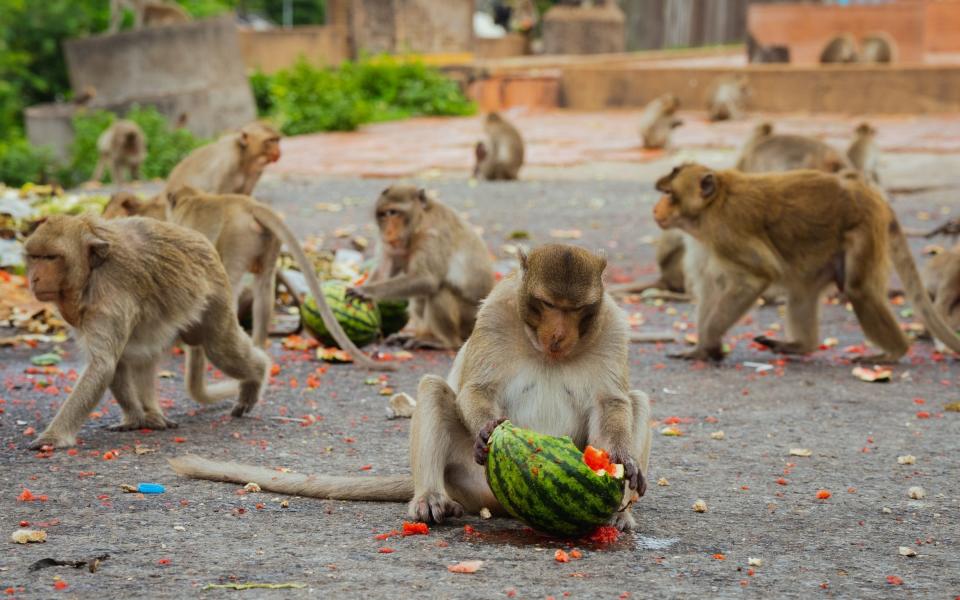
In March, the final straw came when hungry macaques pushed a man off his moving motorcycle while searching for food, and a woman fell over and dislocated her knee.
“The conflict between humans and monkeys has escalated, we have had to take action,” Suttipong Kaemtubtim, director of wildlife conservation at the Department of National Parks, Wildlife and Plant Conservation (DNP), told The Telegraph.
“The root problem was the monkey overpopulation, but they were getting into houses, stealing from shops, from cars, from people’s hands. They were causing accidents – there was an increase in motorcycle accidents involving monkeys. So we had to intervene to get the situation under control.”
In late April, the government announced a three-phase peace plan to capture, neuter and relocate most (but not all) of the macaques. So far, a police “monkey unit” has trapped about 1,200, using tropical fruits as bait to lure the monkeys into net transport crates.
The ultimate goal is to release the macaques into a 3,000-acre sanctuary-like area, but for now they are being herded into large cages scattered around the city, including the “Monkey Garden” in the southwestern suburbs of Lopburi, which has three fully enclosed cages, each holding about 300 of the excitable monkeys who go wild at feeding time.
Mr Suttipong said capturing the macaques and bringing them here was not an easy task, especially as the large number of street gangs in Lopburi had to be broken up.
“There is a class system in monkey society. At the top of each gang will be a larger male monkey who, along with his entourage, has the best status. And then the younger, stronger monkeys can fight to move up,” he explained.
“We have to catch the soldiers in gangs and put each one in a different cage to stop them fighting each other for food and space… they’re all very territorial.”
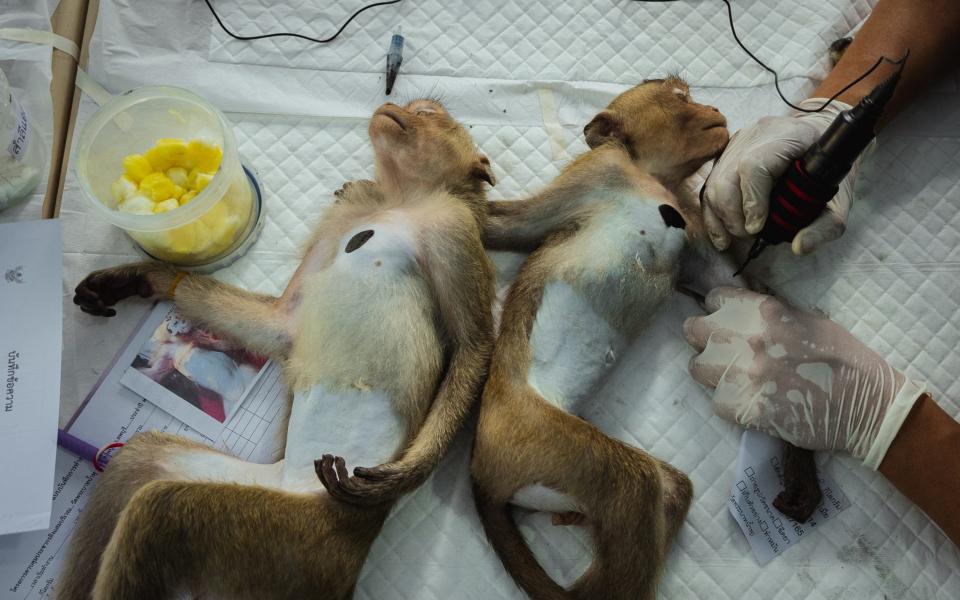

On the other side of the city, a Buddhist temple has built an open-air ‘Monkey House’ enclosure (with a viewing platform for visitors) to house a further 300 individuals. When the Telegraph visited the newly completed enclosure, the strongest macaques were desperately trying to get free – trying to climb the corrugated iron walls with limited success.
But inside a makeshift clinic where vulgar Thai pop songs blared on the radio, there was a more surreal scene: Dozens of macaques, sedated and shaved, were lined up neatly on counters, their arms tattooed with finger tattoos detailing when and where they had been sterilized.
“We neuter them to prevent overpopulation, but we also vaccinate them against diseases like rabies, which can be transmitted to humans,” said veterinarian Sunita Wingwan, DNP, as her colleagues carried the two bewildered new arrivals across the room by the scruff of their necks.
“I cover four provinces, but Lopburi definitely has the biggest problem with macaques. In fact, it has the worst problem in Thailand,” he added.
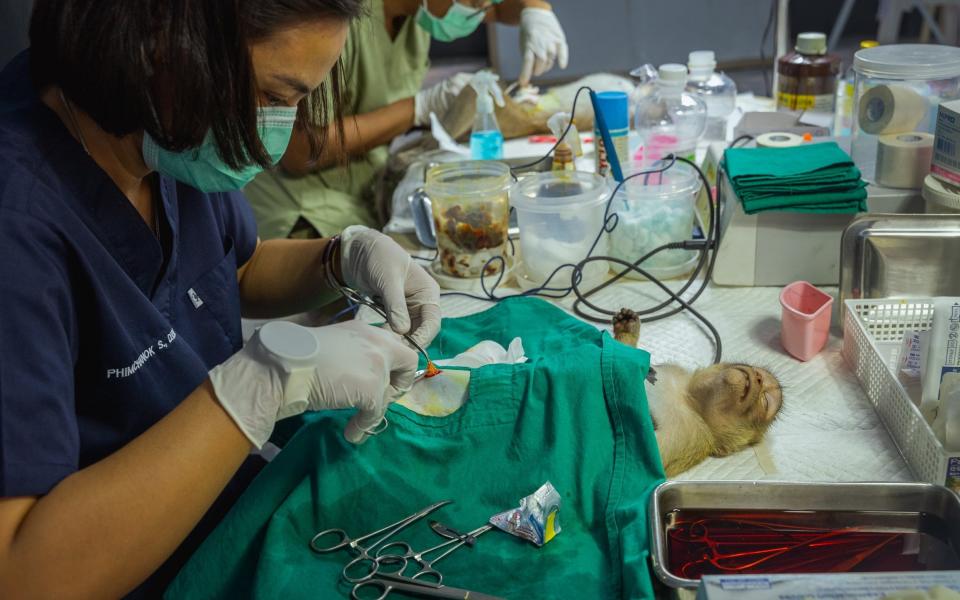

Sterilizing the rapidly reproducing macaques is nothing new — Thai authorities have neutered or medicated about 2,600 of them since 2014 (in a Buddhist society, culling the animals is out of the question), but locals complain that the efforts have had limited impact.
Somporn Iampin, who runs a small shop overlooking an ancient Khmer temple known for hosting “monkey buffets”, said in November that the population had grown out of control in the past six years.
On the shop counter, Ms. Iampin has her deterrent: a wooden slingshot and two dozen clay balls. The monkeys in this area have not yet been collected, and others on the street still have stuffed tiger heads or electric wires to scare them away. Some were serving customers behind metal grills.
“They are constantly causing trouble, coming into the shop, climbing on the tables, snatching the food,” Ms Iampin said, complaining that the new initiative was long overdue. “We don’t want to hurt them but there are too many of them. They are constantly causing trouble.”
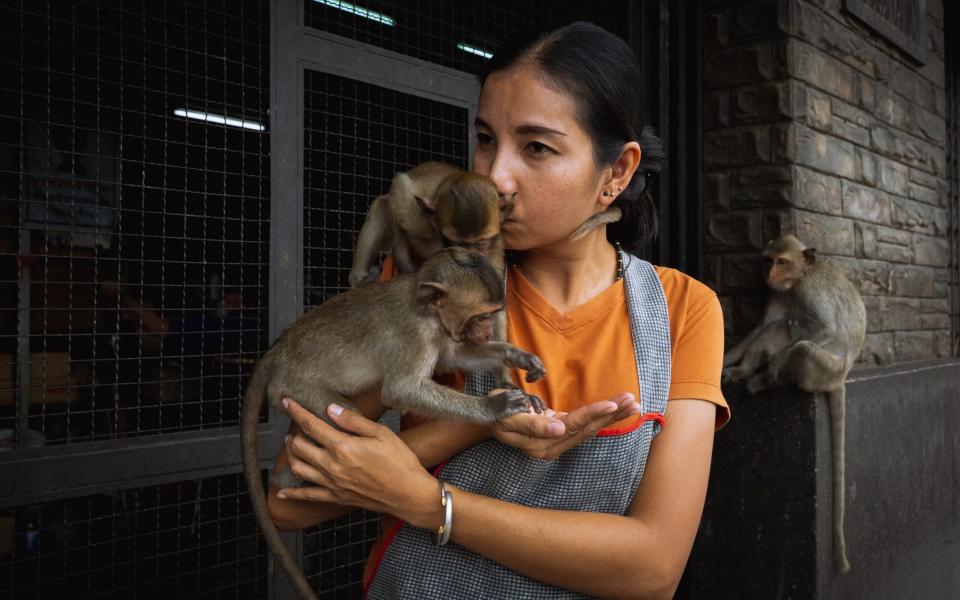

Supaporn Tantiwong agreed that government action was needed and said clearing other areas had reduced the monkey density outside her shop. But the 39-year-old, who runs her family’s car parts business, is not against the macaques and actually lets them crawl on top of the babies.
“I feed the monkeys all the time. I think some people don’t realise that monkeys only become aggressive when they are hungry. There is no natural food source for them here, so they have to find human food,” Ms Tantiwong said.
“I think we need a compromise to control the population, the market and many shops in this area have had to close. We just need to make sure that the cages they live in have good conditions and plenty of food,” he added. “I worry that the government doesn’t have enough money to look after them properly.”
Lopburi Mayor Chamroen Salacheep said earlier this year that he planned to do a “massive clean-up of the town and paint all the buildings” once the monkey operation was completed.
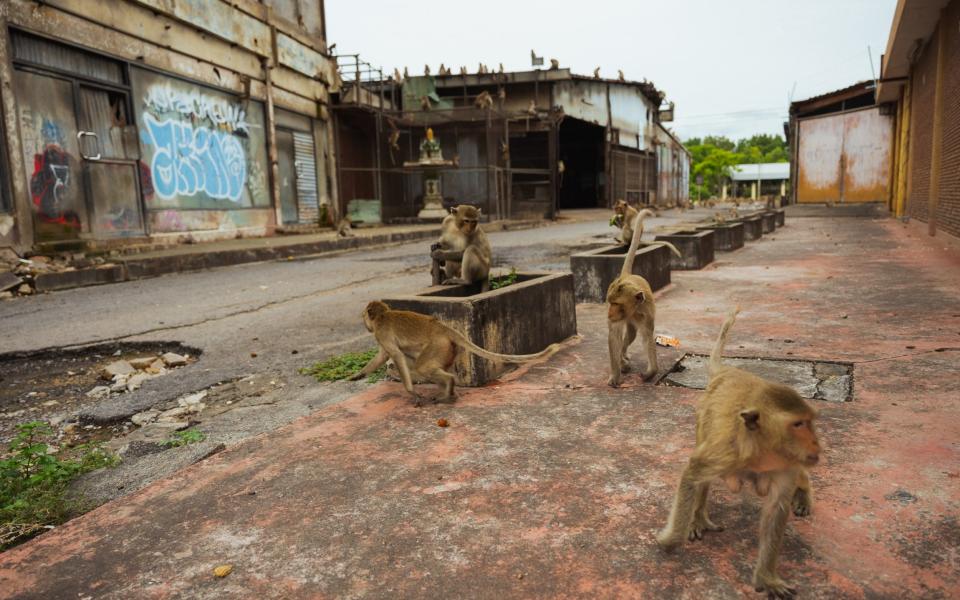

Tantiwong’s only hope is that Lopburi does not lose heart in the process.
“There is a famous story in this area, connected to a monkey character in legends who protected the King,” he said. “At the end of the war, the King’s arrow landed in this city and it became ‘Monkey City’. That’s our history, that’s why people visit here.
“We need to get the population under control, but I’m glad they’re not going to take all the monkeys away. I’d miss them if they went away.”